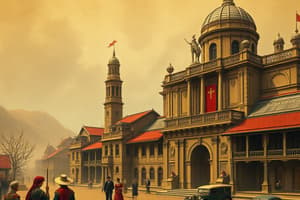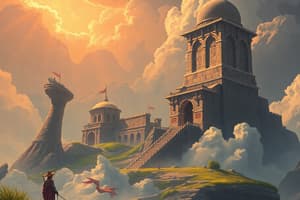Podcast
Questions and Answers
What is primarily studied in history?
What is primarily studied in history?
- Current trends in technology
- Past events, especially in human affairs (correct)
- Future events and predictions
- Mathematical concepts and theories
Which era is characterized by the absence of written records?
Which era is characterized by the absence of written records?
- Prehistoric Era (correct)
- Ancient History
- Classical Antiquity
- Middle Ages
What was a key development during Ancient History around 3000 BCE?
What was a key development during Ancient History around 3000 BCE?
- Establishment of democratic governments
- Development of writing (correct)
- Discovery of the wheel
- Development of printing technology
What significant cultural movement occurred between the 14th and 17th centuries in Europe?
What significant cultural movement occurred between the 14th and 17th centuries in Europe?
What type of historical source provides original documents and artifacts?
What type of historical source provides original documents and artifacts?
Which major theme in history examines class, gender, and everyday life?
Which major theme in history examines class, gender, and everyday life?
Which historian is known for his account of the Peloponnesian War?
Which historian is known for his account of the Peloponnesian War?
Which of the following is a challenge faced in studying history?
Which of the following is a challenge faced in studying history?
Flashcards are hidden until you start studying
Study Notes
Definition of History
- Study of past events, particularly in human affairs.
- Uses a chronological framework to understand changes over time.
Importance of History
- Helps understand present circumstances and contexts.
- Provides insights into human behavior, culture, and societal evolution.
- Aids in critical thinking and analytical skills.
Key Periods in History
-
Prehistoric Era
- Before written records.
- Focus on archaeology and anthropology.
-
Ancient History
- Development of writing (~3000 BCE).
- Civilizations such as Mesopotamia, Egypt, India, China, and Mesoamerica.
-
Classical Antiquity
- Greek and Roman empires.
- Development of philosophy, governance, art, and science.
-
Middle Ages
- Fall of the Roman Empire (~500 CE) to the beginning of the Renaissance (~1400 CE).
- Feudalism, the spread of Christianity, and the Islamic Golden Age.
-
Renaissance and Reformation
- Cultural rebirth in Europe (14th to 17th century).
- Humanism, art, science, and challenges to the Catholic Church.
-
Early Modern Period
- Age of Exploration (15th to 17th century).
- Enlightenment and revolutions (American, French, Industrial).
-
Modern History
- 20th century marked by world wars, the Cold War, and globalization.
- Social movements, technological advancements, and decolonization.
Historical Methods
- Primary Sources: Original documents, artifacts, diaries, letters.
- Secondary Sources: Analyses and interpretations of primary sources.
- Historiography: Study of historical writing and perspectives.
Major Themes in History
- Political History: Empires, governments, and power dynamics.
- Economic History: Trade, industry, and economic systems.
- Social History: Class, gender, race, and everyday life.
- Cultural History: Art, religion, philosophy, and cultural practices.
Notable Historians
- Herodotus: Often called the "Father of History."
- Thucydides: Known for his account of the Peloponnesian War.
- Leopold von Ranke: Advocated for empirical historical research.
- Eric Hobsbawm: Focused on the impact of social and economic factors.
Challenges in History
- Interpretation biases and subjective narratives.
- Limited or biased sources, especially from marginalized groups.
- The complexity and interconnectedness of historical events.
Definition of History
- History is the study of past events, particularly those involving human actions and experiences.
- It employs a chronological framework to illustrate changes and developments over time.
Importance of History
- Understanding history provides context for current circumstances and societal structures.
- Offers insights into human behavior, cultural shifts, and the evolution of societies.
- Enhances critical thinking and analytical skills through evaluation of past events.
Key Periods in History
- Prehistoric Era: Characterized by the absence of written records; relies on archaeology and anthropology for insights.
- Ancient History: Marks the emergence of writing around 3000 BCE; includes significant civilizations such as Mesopotamia, Egypt, India, China, and Mesoamerica.
- Classical Antiquity: Features the rise of the Greek and Roman empires, alongside advancements in philosophy, governance, art, and science.
- Middle Ages: Spans from the fall of the Roman Empire around 500 CE to the Renaissance beginning around 1400 CE; notable for feudalism, the spread of Christianity, and the Islamic Golden Age.
- Renaissance and Reformation: A period of cultural rebirth in Europe from the 14th to 17th century, highlighting humanism, advances in art and science, and challenges to the Catholic Church’s authority.
- Early Modern Period: Coincides with the Age of Exploration (15th to 17th centuries); includes the Enlightenment and significant revolutions such as the American and French.
- Modern History: The 20th century is characterized by major global events like the world wars, the Cold War, and increased globalization, alongside significant social movements and technological advancements.
Historical Methods
- Primary Sources: Include original documents, artifacts, diaries, and letters which provide firsthand evidence of historical events.
- Secondary Sources: Comprise analyses and interpretations of primary sources, helping to contextualize historical narratives.
- Historiography: The examination of historical writing and perspectives, reflecting the evolution of historical thought.
Major Themes in History
- Political History: Focuses on the dynamics of empires, governments, and the nature of power throughout time.
- Economic History: Examines trade, industrial development, and the evolution of economic systems.
- Social History: Investigates aspects of class, gender, race, and everyday life in different societies.
- Cultural History: Encompasses the study of art, religion, philosophy, and cultural practices across various periods.
Notable Historians
- Herodotus: Recognized as the "Father of History," known for his work documenting events of the Greco-Persian Wars.
- Thucydides: Notable for his detailed history of the Peloponnesian War, emphasizing a critical and empirical approach to history.
- Leopold von Ranke: Promoted empirical research in history, advocating for a focus on primary source evidence.
- Eric Hobsbawm: Concentrated on the social and economic factors that shape historical events and processes.
Challenges in History
- Interpretation can be influenced by biases and subjective narratives, complicating the objective understanding of events.
- Limited or biased sources, particularly those from marginalized groups, can hinder comprehensive historical analysis.
- The complexity and interconnected nature of historical events often create challenges in drawing clear conclusions.
Studying That Suits You
Use AI to generate personalized quizzes and flashcards to suit your learning preferences.




